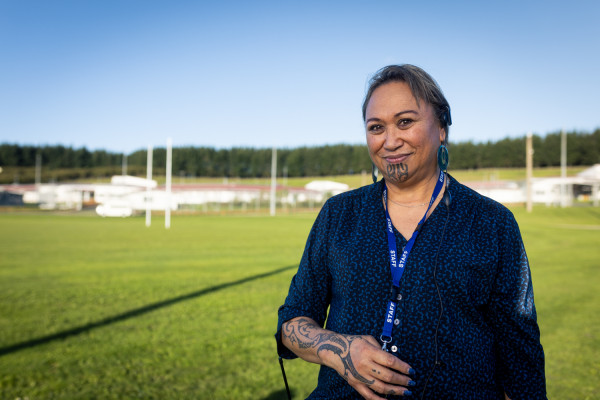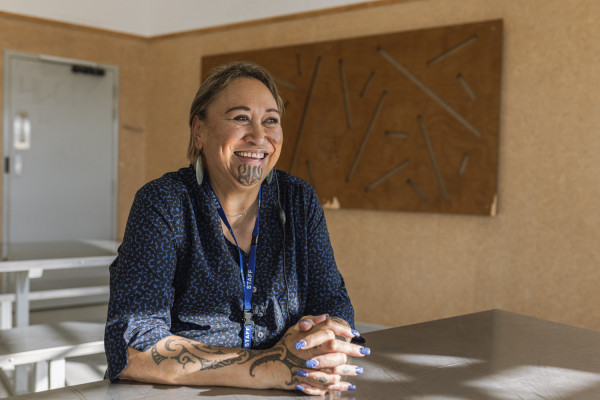9 October 2023
Pourewa's story - Breaking misconceptions
When Pourewa told friends she was going to work for Ara Poutama Aotearoa – Department of Corrections, they asked her ‘why?’. Her own whānau told her she wouldn’t last.
“They were saying things like, ‘That’s really scary’ or ‘You’re too soft. You’ll be a pushover; they’re going to run all over you.’”
Pourewa has now been a Kairuruku Hinengaro [Māori Mental Health Practitioner] at Spring Hill Corrections Facility for two years and it’s her empathetic nature that’s her calling card.
Many of the tāne in her care call her ‘Whaea’ [Auntie] and repeatedly ask by name for her to come and visit.
“You know when you have that connection, that is a success in itself because you’ve built that rapport.”
“I would like to say to people that it’s actually a really good place to be. It's rewarding. Don't get caught up in misconceptions. It’s not what you think it is, it’s safe,” says Pourewa.

As a Kairuruku Hinengaro, Pourewa deals with the most vulnerable men in prison, carrying out welfare checks on at-risk tāne who’ve spent time in the facility’s Intervention and Support Unit.
“So I get to go and check on them, have a kōrero [chat] with them to see how they are, how they're feeling. Are they comfortable in the unit? Are there any concerns?”
“One day, you know, they can be really, really good and happy. The next day something may have happened and it upset them. I always go back to make sure that I can bring them back into the light,” says Pourewa.
Pourewa is no stranger to caring for people. She’s spent the majority of her working life in community healthcare and as a mother and grandmother her gentle, friendly nature is inherent.
They are attributes she credits to growing up on Tūrangawaewae Marae in the Waikato.
“Manaakitanga is one of the biggest things that our marae is known for. I grew up with the most beautiful people. My grandparents lived up the road from us and taught me so much in terms of being a good person.”

One of those lessons was the value of mutual respect.
“I tell the tāne when I meet them that I’m not here to judge, I’m not interested in whatever you have done. I am here to support you.”
But it’s a miracle Pourewa is here at all, let alone able to support and unburden others.
In 2009 after suffering headaches for 3 months, she had a subdural haemorrhage - two massive bleeds on her brain. The pain she says, was indescribable.
“I died while I was on the operating table and they had to bring me back. The staff told me I was their miracle as I came back to life without suffering a stroke or heart attack.”
Just nine months later, Pourewa began losing weight rapidly, her blood pressure regularly hitting close to 200. She was diagnosed with a cancerous overactive thyroid.
“They decided to remove all of my thyroid and I had iodine and radiation treatment.”
Through it all, Pourewa’s determination for helping others has never wavered.
“The passion and commitment to whānau who are in my care is paramount. I have survived some adversities in my life, but I’ve been blessed with a second chance at life because God’s plan is for me to continue to help those who need care and support.”
A key part of Pourewa’s work to help the tāne at Spring Hill Corrections Facility is encouraging them to learn about their history, heritage and culture. She’s a firm believer that it can be both restorative and healing.
“A lot of them want to learn Te Reo. So I'm able to give them just little phrases or sentences that they could use every day to start off with.”
“My goal is for everyone to know and understand about this whenua and the things that happened here and to have a respect for this site they walk on every day. This place was a battlefield so there’s a lot of mamae [pain] here, and a lot of mamae in our tāne too.”
“We're making improvements. You know, the staff are really good, they are starting to learn little things as well,” says Pourewa.
Alongside her day to day duties, Pourewa also helps organise cultural events at the prison, decorating parts of the facility for occasions such as ANZAC Day and Matariki.
It’s all part of her plan to help uplift the spirits of staff and prisoners.
“It’s joyful to be able to do that. I know I’m in the right place, this is where I’m going to grow old”.
Ready to make a move?
Start your journey - check out the a list of our current opportunities then apply online today!